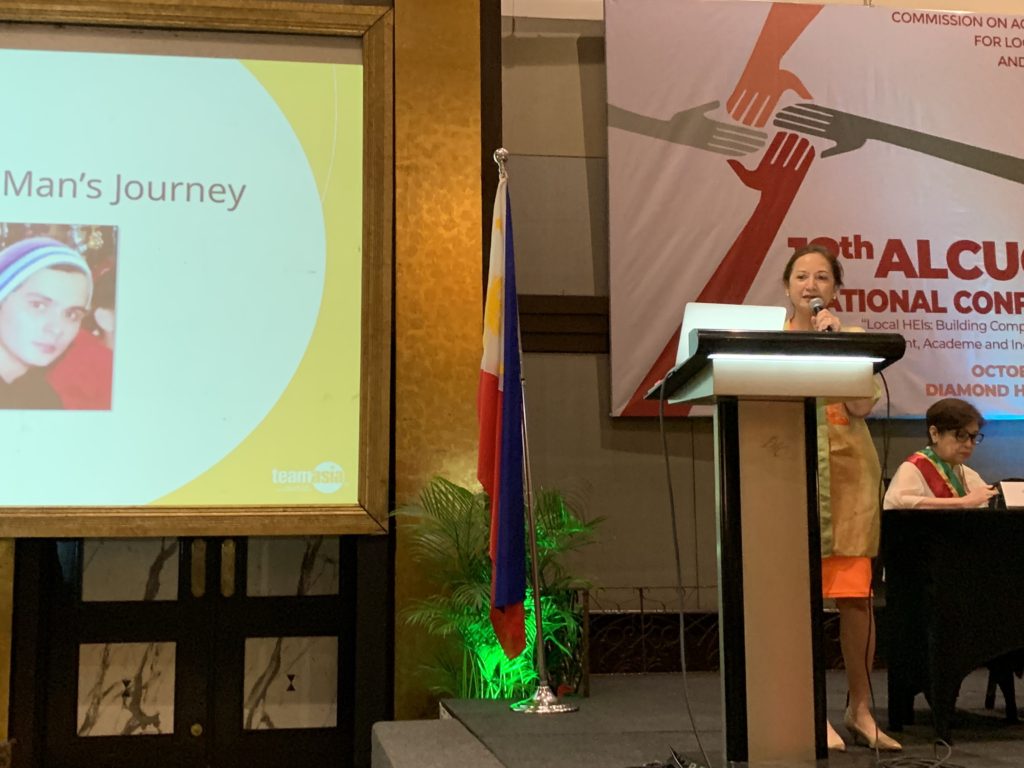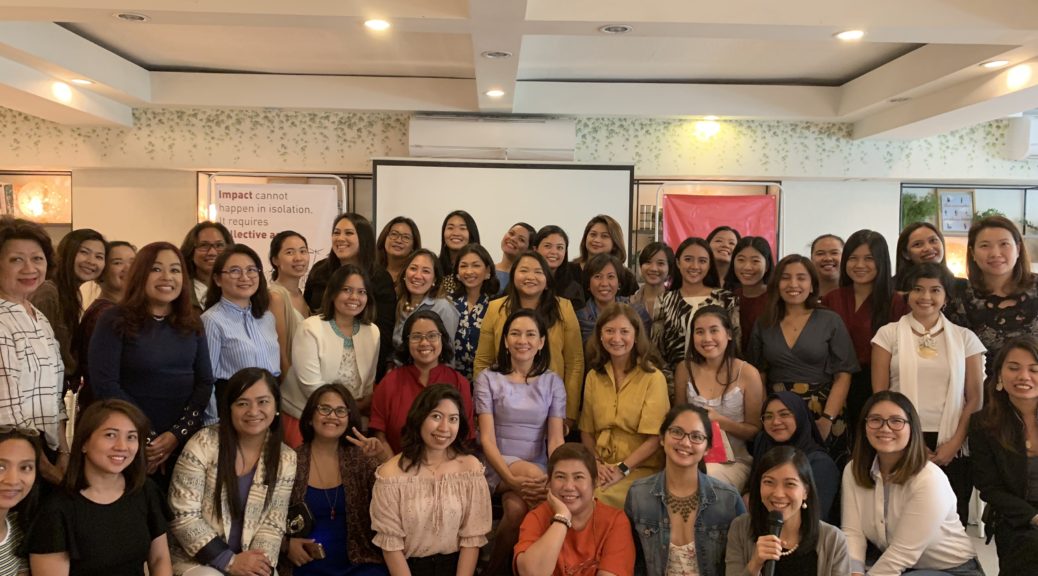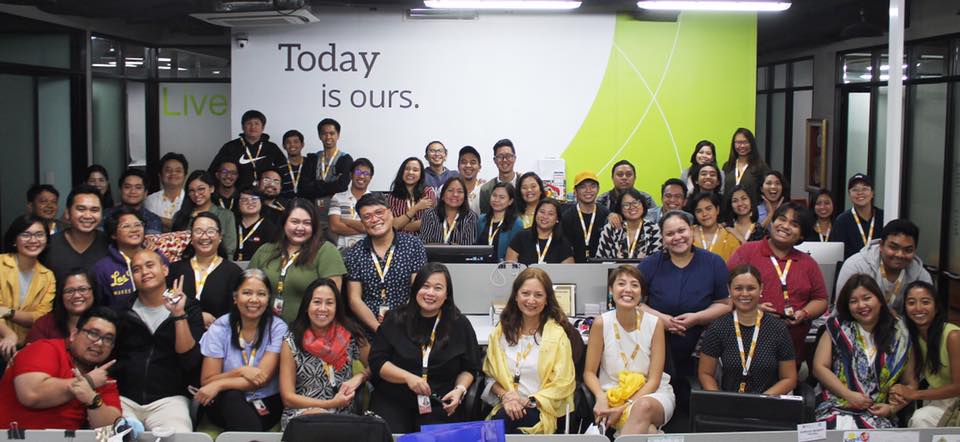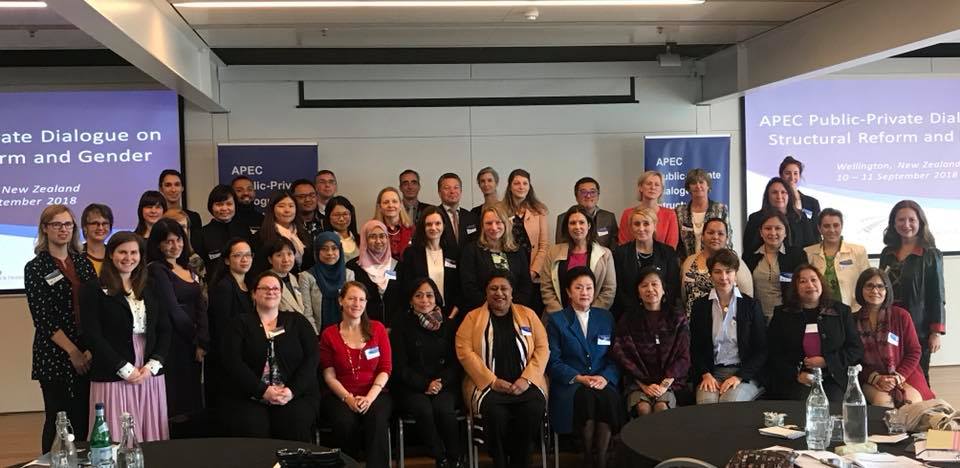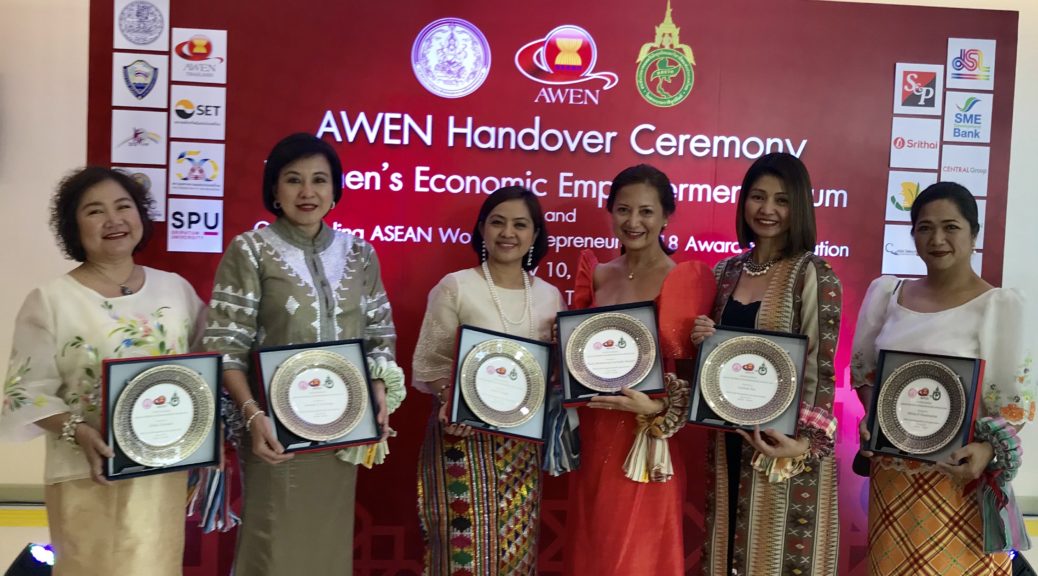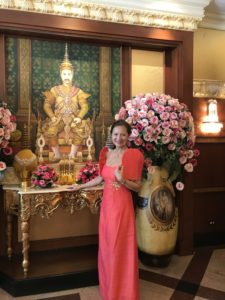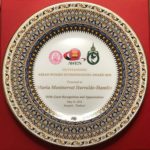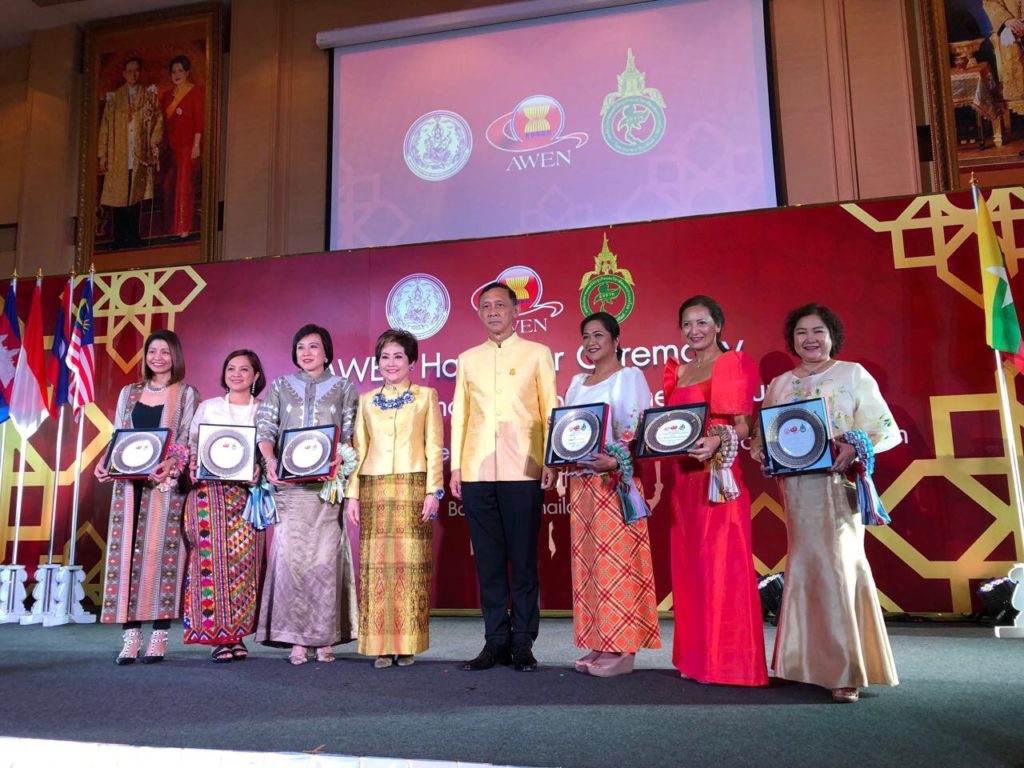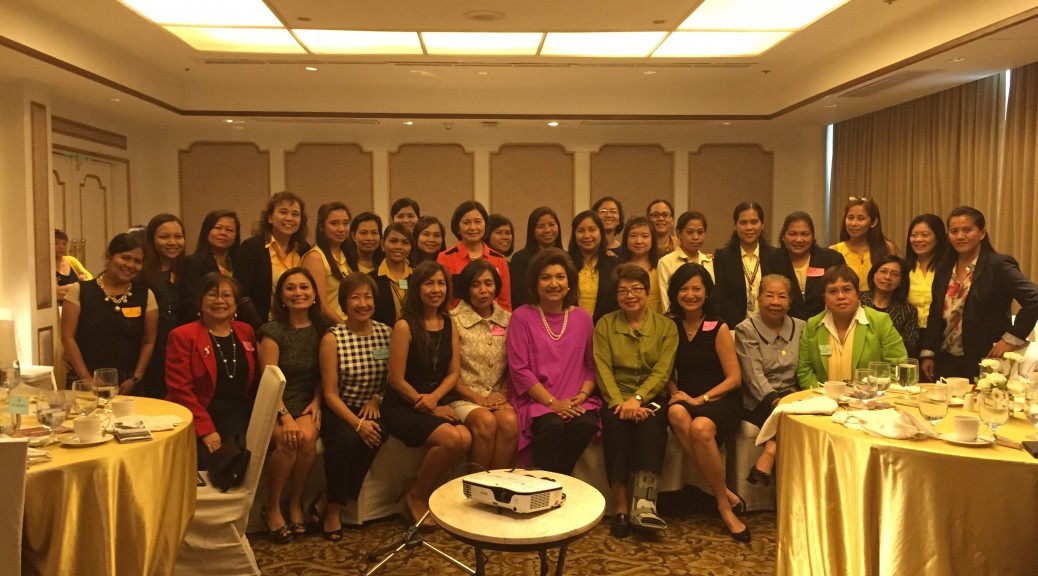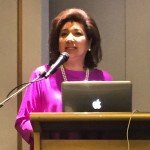September 13, 2018. Somewhere over the Pacific Ocean. For the first time in my life, I visited New Zealand. I attended the APEC Public-Private Dialogue on Structural Reform and Gender as the private sector representative of the Philippines.
Held September 10-11 in Wellington, the forum was a big eye-opener for me. Over two days, I learned how structural reform can help remove many of the barriers to women’s economic participation in the region, and unlock their full potential. Andrew Grant, senior partner of McKinsey & Company, estimates the full potential of women to contribute to the global GDP at $28 trillion per year, which equals the combined economies of China and the US. For a best-in-region scenario of addressing three gender gaps: additional workforce participation, shifting the mix towards full-time work, and improving sector mix and productivity, this could mean an additional $12 trillion per year, equivalent to the combined economies of Japan, Germany and the United Kingdom. Zeroing in further, the Asia-Pacific economies can improve by $4.5 trillion annually, equal to the combined economies of Austria and Germany.
The numbers are staggering, and the potential is great, but many things have to be done to unlock the rewards. Many of the barriers are legislative, regulatory or policy in nature. Addressing low labor force participation in quality jobs, under representation of women in business leadership positions, uneven access to digital technology, and entrenched attitudes about women’s role in society and work are some common themes that call for action. In addition, we need to throw in gender equality in work, provision of essential services to women, legal protection and political voice, and physical security and autonomy.
Dr. Tatyana Teplova, senior counsellor and head of Governance for Gender and Inclusiveness Unit of the Organisation for Economic Cooperation and Development (OECD), stressed the importance of promoting women’s active participation in the global economy to achieve truly sustainable and inclusive growth. Citing research in OECD economies, she identified several remaining gaps in gender equality, such as an 11% gender employment gap, only 32% share of women in senior management positions in central government, 32% average of women supreme court judges across OECD, 28.7% average of women parliamentarians in OECD, and 20% average of young women studying STEM. Alarmingly, 57% of OECD economies listed violence against women as their most urgent priority. The cost of exclusion is high, and Dr. Teplova summarized the three Es that can unlock sustainable and inclusive economic growth as Employment, Education, and Entrepreneurship. She shared the OECD Toolkit for Mainstreaming & Implementing Gender Equality that economies can adopt to address the barriers.
Speakers from various Asia-Pacific economies related how they are currently mainstreaming gender issues. Ms. Chiu-Chun Lin of Chinese Taipei’s Department of Gender Equality shared real life examples of their ten-year journey in implementing the Gender Impact Assessment (GIA), which is both tool and process in practicing gender mainstreaming to achieve gender equality. Recognizing major challenges such as established social norms and gender stereotypes (i.e., men are breadwinners and women are home makers), glass ceilings, and low labor rate participation of women due to childbirth and having to care for children, Ms. Lin shared Chinese Taipei’s initiatives for mainstreaming. These included building women’s capacity through education and training; promoting family friendly workplace policies like maternity/paternity/parental and family care leaves, once a month menstrual leaves, and twice-a-day breastfeeding time; extending access to capital and capacity building for women-owned start-ups and helping small and medium scale businesses through their Women Entrepreneurship Flying Geese Program; promoting board gender diversity in listed companies; and encouraging women’s participation in the government ministries through their One-Third Gender Ratio Principle.
Mr. Kohei Fukawa of Japan’s Gender Equality Bureau, Cabinet Office, explained Womanomics under the Abe administration. In January 2001, Japan established the Council for Gender Equality directly reporting to the Prime Minister with the aim of creating a society in which all women shine. In December 2015, the Cabinet approved the Fourth Basic Plan for Gender Equality with long-term government policy directions and specific measures, which include reforming labor practices such as the tendency to take long working hours and relocations for granted; recruiting and promoting women, developing women leaders and increasing their participation in all fields of society; creating an environment that supports women in difficult situations; enhancing measures to eliminate violence against women; and more.
Mr. Fukawa reported an increase of over two million women in the workforce in the past five years under the Abe administration. Over the same period, nursing home capacity has increased by over 600 thousand to ease the waiting time for child nursing care facilities, allowing mothers with young children to re-enter the workforce. Realizing that Japanese women work much longer for unpaid work, while men are paid for their work, Japan is making a big push towards improving work-life balance. Work-Style Reform Legislation was enacted in July 2018 calling for equal pay for equal work and setting an upper limit for working hours. As a reward, “Eruboshi” Certification is granted to companies that engage in good practices, with additional points in the evaluation of public procurement for those promoting work-life balance.
Ms. Nguyen Thi Thu Ha shared Vietnam’s national strategy for gender equality, hinged on the following objectives: strengthening women’s representation in leadership and management positions; narrowing the gender gap in the economy especially in the rural areas; improving human resources through education and training; ensuring gender equality in accessing and receiving health care services, in culture and information, and in family life; eliminating gender-based violence and enhancing the capacity of state management on gender equality. Results of Vietnam’s initiatives are seen in political leadership where a woman serves as the current chairperson of the national assembly and three women serve in the politburo. Literacy levels for women is up 92%. Social insurance laws are in place, providing parental leaves for female and male laborers, establishing a safe working environment for women, and setting up kindergartens in industrial zones. With the help of central and local radio and TV stations, there is better public awareness of gender equality, encouraging men to share the housework and women to share the family’s economic burden.
The head of the Equality Unit of Iceland’s Ministry of Welfare Ms. Rosa Guorun Erlingsdottir shared why Iceland continues to rank first in the gender equality index. It was not always like this though, as she shared how the women of Iceland fought for women’s equality. Although women in Iceland won the right to vote in 1915, behind New Zealand and Finland, women’s uptake in leadership positions in government was slow. Compared to 16% to 23% in other Nordic countries, Icelandic women comprised only 5% of parliament seats in 1975. Naturally, this was frustrating for Icelandic women.
Ms. Erlingsdottir shared how Affirmative Action can make change happen. On October 24, 1975, now known as Women’s Day Off, Icelandic women decided it was time they were taken seriously by the men. On that fateful day, instead of going to work, doing housework, or taking care of their children, women decided to go on strike, taking to the streets and demanding for equal rights. Work came to a standstill. Services stopped. Suddenly, men realized the importance of women as they had to take care of the children, with many not knowing how to go about it. Since then, women have enjoyed great strides to gender equality.
At present, Ms. Erlingsdottir reported that 79% of women are actively employed, with 34% working part time. There are gender quotas on public committees and company boards, and laws in place requiring certification of equal pay. There is an all-women political party, paving the way for women to hold 38% of parliament seats in 2017, and 44% of local governments seats in 2018. Women make up 2/3 of university students. Ninety percent of children aged one to five years are in day care centers, with municipalities footing 85% of the cost. Parental leave legislation allows equal rights for men and women, with three months each for males and females, and three months shared rights for parents. Because of this legislation, over 90% of fathers have taken their paternity leave, drastically changing ideas about masculinity. And I dare say, they actually enjoy it from the photos she showed of fathers with their young children.
The economic benefits are clear. The increase in the number of women employed has raised per capita Nordic GDP by 10-20% over the past 50 years. Closing gender gaps in the next 20 years are predicted to boost Nordic GDP growth by another 15-30%.
Interestingly enough, the RTS Senior VP of McKinsey & Company Australia Jovita Gartlan believes that in some cases it is the women who hold themselves back. Sharing her personal experience while attending a meeting where the participants were asked if they wanted to take on the top post of the company, most said they did not want to. They were happy with their current situation, and felt that they had too much on their plate already and did not want the additional stress.
Citing McKinsey research on women in the workplace, Ms. Gartlan said that while women are just as interested in advancing as men, they progress more slowly through the corporate pipeline. And while women ask for promotions as often as men, men move up faster without having to ask. She noted that less women aspire to and believe they will become a top executive, and that fewer women than men enjoy the support of their managers in their quest for advancement. The studies are clear: gender greatly impacts women’s opportunities, especially since women have to do most of the housework (which is unpaid) after a full day’s paid work at the office. Given the double work shift of home and office, and having to care for children and the elderly, no wonder women hold back.
For organizations that wish to change the game and move more women into positions of leadership, Ms. Gartlan recommends building a strong business case for change, redesigning roles to enable more flexible arrangements, actively sponsoring potential women leaders, providing reinforcement mechanisms that support women through life transitions and challenge traditional views or merit in recruitment and evaluation, investing in training to build leadership capabilities and giving them experience in key leadership roles. She urged women to actively ask their managers not just to mentor them, but to sponsor them for promotion. And for those who feel happy where they are, to embrace the feelings of “being enough” and not feel pressured.
The forum also gathered indigenous women holding leadership positions in the public and private sectors. Linda Paru of Papua New Guinea talked about the challenges women entrepreneurs, especially those from MSMEs, faced such as lack of access to credit and the high cost of internet and ICT. While there are many challenges, she cited telecoms and financial reforms that contribute to MSME’s participation in online services, digital finance, e-health and e-education. Senior Adviser for the Status of Women in Canada, Anne Fontaine spoke of indigenous women’s issues, rights and interests in Canada. Ms. Rangimarie Hunia, director of Ngāti Whātua Ōrākei Whai Maia Ltd., spoke of the leadership role of Maori women, being a prime example herself of a strong Maori woman leader intent on securing the future of her mokopuna or the next generation.
Ms. Josephine Cashman, Founder, Executive Director and Managing Director of Big River Consulting Pty. Ltd., spoke of her experiences with legislation and regulation implementation and enforcement. It is one thing to come up with laws against domestic violence and gender discrimination, and another to implement it. She recounted the experience of an elected female MP who resigned because of bullying from her male colleagues; they were more interested in her hair and attire than her policy work. The statistics in New Zealand are harrowing: one in three women have suffered physical or sexual abuse; one in five were harassed at work and one woman per week is killed by a former partner. The statistics are even more alarming for Maori women. Strengthening enforcement is thus crucial.
To combat this, New Zealand has embarked on a national campaign against domestic violence and gender discrimination. New Zealand has passed legislation granting victims of domestic violence 10 days paid leave to allow them to get away from their abusive partners, relocate and protect themselves and their children. The only other country that has passed a similar law on a national level is the Philippines under the Anti-Violence Against Women and Their Children Act of 2004, granting up to 10 days special leave for victims and stiff penalties for employers who try to impede such leave.
Gender Pay Equity was another hot topic. And here, Ms. Rosa Guorun Erlingsdottir of Iceland shared the inroads they are doing to reduce the estimated 20% difference in pay between men and women. Iceland has made it a legal requirement for employers with 25 people and more to get an Equal Pay Certification which must be renewed yearly. This means Equal Pay for the same Work or Work of Equal Value. To ensure there is no discrimination, an audit is done of jobs of equal value, separating the job from the person doing it. Employers are asked to rank jobs, which are then paired with jobs of equal value. Companies that get the certification are also allowed to use the Equal Pay Symbol in their corporate promotions. Companies that do not follow the law are fined.
Participants were fully engaged in two workshops. First was a practical group exercise on Gender Impact Assessment where each table was asked to weigh in on a country-wide issue that affects women and to recommend how to handle the situation. Our group was presented with a Public Sector Scenario of a drastic slump in the economy causing businesses to close and government wanting to reduce its overhead. The department mandate is to limit government jobs to only one person per family. With approximately 40% women in government positions, of which 39% have frontline service positions while 27% have back office positions, 21% in middle management positions, 13%in senior leadership positions and 29% working part time, it was obvious that women would be the first to lose their jobs.
Our animated discussion revolved around how to consult the public and women in particular on the proposal and what changes in the draft resolution we recommended. We looked at how families will want to keep the full time, higher-paid member on government payroll to ensure continued family income, and how the government can assist families that are affected such as stepping up skills training, giving higher separation pay, providing priority access to funds and markets, giving plus points in government procurement for those let go, and ensuring gender neutral criteria in the selection of those to let go. The group discussion highlighted the disparity in economies of Chile and New Zealand where the unemployed enjoy six months insurance versus that of Mexico and the Philippines, where no work means no pay and no food on the table.
To cap the two-day dialogue, Mr. Phil O’Reilly, New Zealand APEC Business Advisory Council Member, facilitated a whole group discussion on next steps that APEC can take to push the agenda of structural reform and gender. The group came up with a long list of recommendations, such as collecting data and best practices for gender plus lens across APEC economies and sharing this in a digital portal for easy access, conducting and making available research on gender pay standards and how to close the gender pay gap, studying the OECD Toolkit to determine its adaptability in the region, and establishing a pathfinder initiative that looks at how gender is incorporated into all free trade agreements, to name a few.
I look forward to finding out what APEC will adopt as its next steps given this first foray into a dialogue on structural reform and gender. Definitely, there is a lot that needs to be done to remove barriers to women’s economic participation in the region, and unlock their full potential. What is clear to me from this two-day dialogue is the urgent need to measure and know disaggregated gender data using the Gender Plus lens. Unless we establish a base line, we won’t know what needs to be done and how we are progressing. As New Zealand’s Acting Policy Director for Economic Independence of the Ministry of Women, Ms. Riripeti Reedy said, “You only treasure what you measure.” We have to start now.
